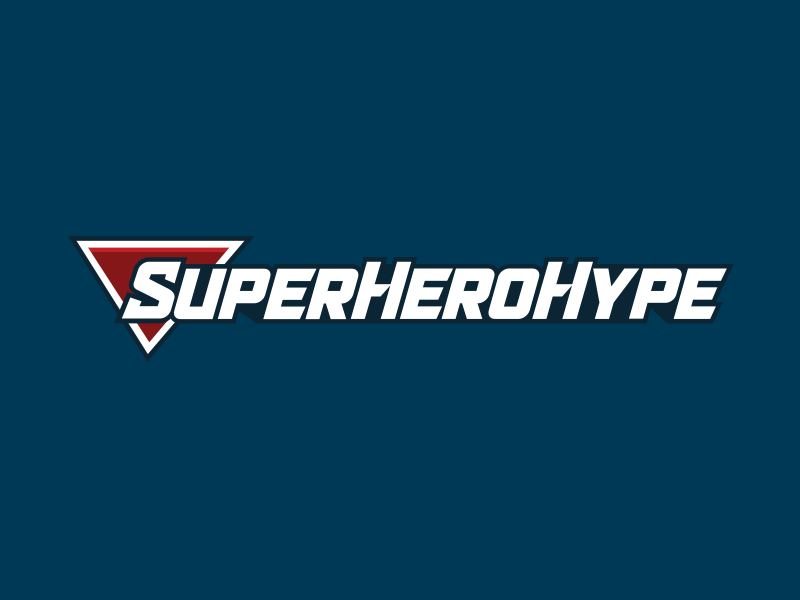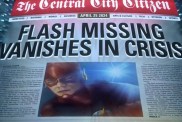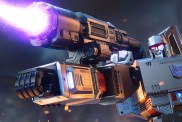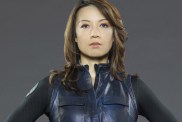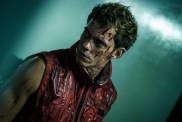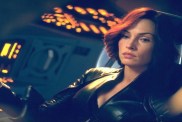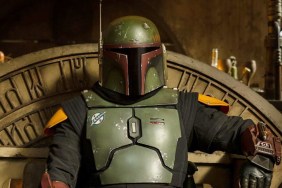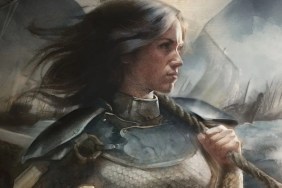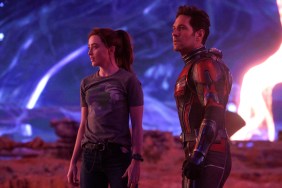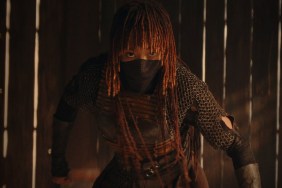
Compared to other movies based on graphic novels, it’s been a relatively short road for writer Andy Diggle and artist Jock’s Vertigo Comics series The Losers to come to the screen, and based on what we’ve seen so far, the material seems to be in fairly safe hands under the guidance of director Sylvain White.
It might seem like an odd pairing being that White is best known for directing the street dancing movie Stomp the Yard, but he’s also an avid comic book fan who has been circling various comic book projects over the years, including a movie based on Frank Miller’s Ronin. In the case of The Losers, he was lucky enough to have great source material that lends itself well to the screen, probably because both Diggle and Jock were greatly influenced by the action movies of the late ’80s, particularly the movies of Joel Silver, who would come on board with Dark Castle to produce the movie.
The concept of the comic book and the movie is that a group of former government agents–team leader Clay (Jeffrey Dean Morgan), tech expert Jensen (Chris Evans), military men Roque (Idris Alba) and Pooch (Columbus Short), and the silent sharpshooter Cougar (Oscar Jaenada)–have come up with a plan to take down the people who set them up while on assignment in Afghanistan and left them (presumably) dead for years. The five men are joined by the mysterious Aisha, played by the sultry Zoe Saldana, a deadly female mercenary who has the inside track on bringing that plan to fruition.
SuperHeroHype spoke with Sylvain a couple months ago on the phone, just a few days after the first trailer premiered. We talked mainly about the involvement of the comic book creators and what he took from the comics, but we eventually got to talking about video games.
SuperHeroHype: I’ve spoken with Andy and Jock on Twitter and they both said they liked the trailer. Not sure if you’ve talked to them in a while.
Sylvain White: Yeah, yeah, they’re great guys. They actually came by during the shoot, and I have to call Jock because he drew a few frames for me, because we’re doing these special introductory cards to the characters where we’ll dissolve from the actor to the drawn frame. It’s very cool to set the tone of the movie. He did some tests for us, which were really nice, but I gotta call him now to do the real thing.
SHH: That’s for the title sequence?
White: It’s actually a little bit into the movie and it’s basically as we introduce the character.
SHH: I was surprised when I heard the movie was getting made. I hadn’t actually read the comic when it first came out and I just started reading it when I knew I was going to talk to you. My first question would have been, “What made you want to turn this into a movie?” but it’s kind of self-explanatory, because the comic itself is very inspired by action movies. Did Joel Silver contact you to direct it or how did you get the gig?
White: Well, I was interviewed initially with Akiva Goldsman, and then I did a follow-up interview with Joel Silver, yes, where I pitched my take and why I wanted to direct it, and why I was interested, and I did sort of a visual presentation in terms of how I saw the movie, and that’s how it happened.
SHH: Cool, cool. Had you already read the comics just on your own beforehand?
White: I knew of the comic but I hadn’t read them, so it was kind of cool when I heard of the project ’cause I jumped on it. I read a lot of comics and I’m familiar with a lot of them, and I certainly was aware of many more, but obviously it’s hard to read everything. I grew up reading a lot of graphic novels in Europe–I grew up in France–so I’ve always had this sensibility and that interest. Reading it was really nice for me, because I thought it was really fresh, and I thought it had the opportunity to create sort of a unique toned movie with a fresh take in essence where you can combine heavy, gritty action, kinetic action with a very light fun tone and humor in a sort of cocktail that works in a unique way. That’s the sensibility that I think that Diggle brings to the script in the comic, and that I really tried to translate.

SHH: “The Losers” isn’t like “Spider-Man” or “Watchmen,” where a lot of people have read them, and often when a movie is based on a lesser-known comic, they’ll just take the idea and go off in their own direction. From what I’ve seen, there seems to be a lot of stuff right from the comics. The characters are the same, and it seems to really be the comic brought to the screen. Was that the plan from the very beginning or was that something you brought to it as you got involved?
White: The first thing in the adaptation was that there’s multiple volumes and how to tell the story. We’re basically following the story pretty much linearly based on the different volumes of the graphic novel. We’re not trying to condense the story at all, six volumes into one, or anything like that, we’re just really following the first and second volume in terms of plot guidance for the movie. I think that’s something that’s smart, and also, it leaves the opportunity for sequels with all the great source material that’s there. So this is kind of like the first chapter in getting to know these characters and what first happened to them, and what put them in this predicament and sends them off on their call to action, their mission. The best appeal of the movie to me is this combination I feel like I was successful in getting with the duality of tones with the gritty action and the really fun light moments. I think it creates for a very cool fun experience, where you get hyperkinetic action and then you can laugh out loud at times and really fun moments. It’s a really good ride in that sense.
SHH: Is the story mainly the “Goliath” story? In the first couple of volumes, we don’t really see their back story and what happened in Afghanistan, so do you show that in the movie?
White: Yeah, instead of telling it in flashback like in the graphic, we actually tell it linearly, so we actually start with what happens to them in the first act and see the consequences of that. It’s kind of good, because it creates a good emotional anchor for them, and now they have to redeem themselves. We know what they’ve gone through. We also embrace a little bit the flashback motif of the graphic to remind us of the stakes, and we reveal part of what happens later on as well. It’s kind of nice device that basically mirrors the format of the graphic and at the same time, applies itself well to the movie.
SHH: When you came on board, were any of the actors attached in certain roles or did all that happen after you got the gig to direct?
White: No, that was very fortunate. I came on and I was able to develop the screenplay with Jamie Vanderbilt, the writer, and Akiva Goldsman, probably for about three months. Once the screenplay was basically in good shape–I had a director’s cast on it–we sent it out to talent and I was fortunate to be able to get the cast I wanted, all my first choices. The studio was very supportive of my choices. I really wanted to go with an unexpected, edgy cast. I didn’t really want to go too commercial, I didn’t want to cast people that you’ve seen a million times before in those roles. I wanted a guy who had never played a bad guy before. That’s how we found Jason Patric and all the cast. Jeffrey Dean (Morgan) for the role of Clay was the first guy I locked in. We met a few months early, and it was very clear to me, he was the guy. He just had the right energy, and he seemed just perfect. Columbus Short was a guy I worked with, he was the lead in my last movie, so I really wanted to bring him back, particularly because he’s got such this likeable quality. You want to be his buddy. Pooch is really the glue of the crew, and he brings a lot of the emotional naïve quality that one needs to cling to to accept these characters, so I thought he’d be perfect. Chris Evans I think is remarkable in this film. We see really a nice comedic side of him that we haven’t really seen before, and that makes his character very unique and probably the most fun character of the movie I’d say. Idris Alba, I’ve really wanted to work with him for awhile. I had met him a few times on some other productions and was really looking for something to do with him, and we actually changed the role a little bit to make him part of the movie, and I was really happy the studio was really supportive of that choice as well as all the other ones. Zoe Saldana…
SHH: She looked quite amazing in the trailer.
White: Yeah, she’s quite… She had worked on a movie called “Haven” that a friend of mine directed, so I was really familiar with her work for a long time, and I’d seen a couple other indie film festival movies, and I just really pushed her at the time… “Avatar” wasn’t out, it was still being fabricated when I was casting it. Nobody really knew it was going to happen with her exposure. I just really wanted to work with her, and I thought she looked so close to the character in the graphic, sort of multi-ethnicity, you can’t really define where she’s from. She’s so beautiful and athletic and really carries the drama and the complexity that character needs. She just delivered in such a cool way. I was really, really pleased with her. Of course, now with all the exposure she’s had from “Avatar,” just solidifies her status. In this movie, what’s great about this role, I’ll say this, is that she’s not yet another female in distress in an action film or surrounded by a crew of guys. It’s not typical in a sense in that she’s really the driving force of this crew, she’s their bankroll, she basically gives them their call to action. She saves them quite a few times. She’s really the driving force. She’s never the one in distress. She’s kicking ass, she’s probably the baddest warrior of all of them, which is pretty remarkable, and she was able to carry that and make it believable, and she worked really hard for that.

SHH: I want to talk about the Joel Silver factor. Andy and Jock were influenced by “Lethal Weapon” and the other movies Joel did with Shane Black back in the ’80s and ’90s, so can you talk about what he brings to a movie like this… besides making it easier to blow things up?
White: (laughs) Basically, Dark Castle, which is his company, really acts as the studio in this case. He almost plays the role of executive producer, but certainly, his name alone carries a lot of weight when you want to hire. I was able to get some of the best crews in the business in terms of stunts, in terms of special FX, visual FX. Especially, at the time that we were shooting when being in a Joel Silver production really helped me surround myself with really high quality people. You know, this was my first action movie, and I needed and wanted to be surrounded with people of great experience, that could really complement the vision that I have. That’s really where the benefit of being a Joel Silver film came in, I think. Also, his level of expertise in terms of action came in handy for me for certain sequences. It was really great to have him as a quote-unquote expert to bounce ideas off of and just share some creative takes on it. He’s been good. Actually, the experience with the producers–you don’t hear that often from directors, especially dealing with two big producers like Joel Silver and Akiva Goldsman–has been really, really pleasant. During production, I was in Puerto Rico, we shot the entire movie there…
SHH: Why was that? I was curious about how you ended up in Puerto Rico.
White: It was great, it was absolutely fantastic. The place offered a multitude of locations and looks. It’s a locations-based movie, so I was able to really replicate multiple cities and even countries there within a very small proximity or radius. It was very convenient, the local crews were great; we used a lot of local crews on this movie. We brought in mostly just the key department heads, and it was a really nice shared experience. I’ve got nothing but positive things to say about that. It was a truly remarkable experience and it was great for the actors. It’s such a beautiful environment to work in. I’m sure it played a role in getting the actors on this movie, because they had such a beautiful environment to work in… “We’re shooting in Puerto Rico, do you want to go?” (laughs) It was really fun, and it was a great backdrop for this movie. It just turned out that I had scoped out different places to shoot the movie. We needed to sort of rally up one location to replicate and cheat different areas and different cities of the world, and as I went to scout there, it just seemed to be the place that gave me the most options.
SHH: Jock’s art is so stylish and I can see a couple of shots in the trailer that were taken from the book. He’s also been involved in the marketing and also doing some art in the movie, so was that something you wanted to do, having the same look from the book by getting the artist involved? Was that your call?
White: Absolutely, from the get-go. My intention was… there were a few things that I thought were remarkable in the books. One, the design work I think was pretty top-notch. Jock is an amazing designer and people use him on all kinds of stuff. To me, he does remarkable work, so it shows right there. That I wanted to stay true to and have some sort of aesthetic coating to the movie that reflected that. Secondly, I thought the use of the colors in the graphic novel were remarkable, the primary and secondary colors are always prominently used per chapter in the book. It really created a different mood every time you turn the page and you land in a different location or a difference action scene, so I really tried to pay attention to those elements in particular, in really staying true to the sense of the colors and the palette and the atmosphere that the graphic novel pages had. I didn’t really go and replicate frames or anything like that. There’s one sequence where I kind of throw a wink back at Jock, which is one of the scenes in the trailer where Jensen is shooting with his bare fingers. That’s my one wink scene at Jock which I carefully talked to him about and how I was going to shoot it, so that’s kind of a cool homage I thought. But yeah, also I bookend the movie with some of his artwork. Like I said, the opening of the movie, the main title card and the introduction of the characters, there’ll be graphic novel imagery there, and also the main title credits. It’s kind of cool. I want the movie to have a comic book/graphic novel aesthetic, but I don’t necessarily want it to be obtrusive to the experience. I felt throughout the movie, you just go with it. You’re not necessarily reminded of the graphic novel once you’re in the world, but I like it as a book-ending device, just like opening the pages and diving in.

SHH: That’s very cool, because there are movies like “Wanted” which have very little to do with the comic and like I said before, this was one where you could definitely have gone that way, but using art from the comic book is a really cool way to keep it grounded. I don’t know if you can talk about this, but there was all this strange release date changes a little while back. Did you have to do reshoots or more work on it?
White: I gotta say that I’m really proud and I like to advertise this, but this is basically my fourth movie, and I’ve always come in on time, on budget, on schedule. I’ve never had to do one day of reshoots or recuts, which is pretty amazing. Going into this movie, because of the scale of the movie and the schedule we had, which was tight, and the genre of action, everybody thought that I was not going to be able to keep that record clean. But I was really happy to show that off, and we did come in on budget, on schedule. There are no reshoots, no pick-ups. The shift in the schedule is really basically a marketing strategy. They really just picked the best date they feel based on the other releases, and the movie’s coming out and some movies shift around and they reposition. We were always kind of set to come out sometime in April and for a short second, they thought they might move down to June, but an opening came up in April and they went right back to it. I’m really excited actually about this, and no, I think it’s very positive.
SHH: Do you have any idea what you might do next? I know you’re into comics and at one point, you were going to direct “Castlevania” and that fell apart, but do you have interest in doing other horror stuff?
White: Yeah, you know, horror was kind of my first love. “Castlevania” kind of broke my heart, because I’m a big video game player, and I’m a big fan of that video game, I’ve played it basically my whole life since the ’80s. The movie was almost ready to go, we were about a month before going into pre-production, and then the strike hit and kind of stopped everything, and then that division at Universal closed, so the project kind of went away unfortunately. That’s one I’ll miss, because I was really ready to go on it, and I had a really cool vision for it. But you know, there’s other things that I’m looking at and I have in development at different stages. My sensibility is that I like to make movies that are sort of… not to say a youthful audience… but I’m looking for stuff that’s new and edgy and cool that teenagers and people in their ’20s can gravitate towards. I like underdog stories, stories of redemption, so I’m looking for that. “The Losers” is a perfect example of that as an archetype, and so is “Stomp the Yard” ultimately as well, so I like those kinds of stories and I’m looking for that, but I’m kind of combing projects across. There are some projects I’m looking at that are like “Castlevania,” which are period, and some stuff I’m looking at is futuristic. I love sci-fi, I’m a big sci-fi geek, so yeah, I’m just trying to find the best projects.
SHH: It’s funny you mention video games, because it’s really amazing what they’re doing in them these days. Have you thought about maybe trying to a different video game movie or are they too good in that medium to try to bring them to the screen in a way that’s as good or better?
White: No, it’s funny, because people often speak of movie versions of video games having not particularly been good in the past. Like there’s a stigma to it, for some reason. I think it’s all irrelevant in the sense that there’s great concepts and great properties and great ideas in video games. There’s no reason why you can’t find a good narrative story within that, that would apply to a movie format. I mean, there’s great narratives in video games as they exist for a games format, and all they need is to be adapted in the correct way, it just hasn’t necessarily been done that well that frequently in the past. But yeah, I think there’s a ton of great properties and video games that would make awesome movies. I also believe that the next thing down the line I think that the two would ultimately merge, and you’ll eventually just have movies that you can play or decide what happens in the movie or be the character in the movie and actually control the characters. I’m looking conceptually at some ideas and the technology for that, that’s also something I’m really interested in.
SHH: As I was saying, video games these days look so good that it’s hard for movies to compete with them. They look amazing, have great stories and you can also play them.
White: Yeah, absolutely, and they have multiple endings based on the decisions you make, and they have cinematic sequences. The artform has really elevated itself in the last ten years. It’s really reaching a point now where the technology is supporting it and you’re able to do really amazing stuff. I’m really trying to get involved, especially in the design of the cinematic sequences in video games. It’s really something that interests me, I have such a passion for it.
The Losers opens nationwide on April 23. You can also read what Sylvain said about development on his movie based on Frank Miller’s Ronin here. Also look for our exclusive interviews with the cast next week.
Source: Edward Douglas
